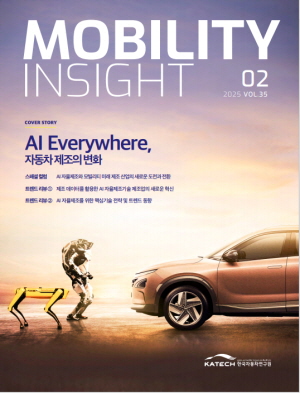한국자동차연구원(원장 진종욱)이 최근 발행된 모빌리티 인사이트 2025년 2월호에서 제조업이 직면한 여러 한계를 극복하기 위해 인공지능(AI)을 도입해 생산성을 높이고 인력 감소, 공급망 안정화, 탄소 감축 등의 과제를 해결하는 ‘AI 자율제조’라는 새로운 패러다임에 대해 집중 조명했다.
모빌리티 인사이트 2025년 2월호 발간

한국자동차연구원(원장 진종욱)이 최근 제조업이 직면한 여러 한계를 극복하기 위해 인공지능(AI)을 도입해 생산성을 높이고 인력 감소, 공급망 안정화, 탄소 감축 등의 과제를 해결하는 ‘AI 자율제조’라는 새로운 패러다임에 대해 집중 조명했다.
자동차연구원은 최근 발행된 모빌리티 인사이트 2025년 2월호에서 ‘AI Everywhere, 자동차 제조의 변화’를 주제로 다뒀다.
산업통상자원부는 ‘AI 자율제조 얼라이언스’를 출범하고, 2024년 10월 AI 자율제조 선도프로젝트를 공개하여 AI 기술의 제조 전 공정 확산을 적극 지원하고 있다.
자동차연구원 또한 이 선도프로젝트에 참여하여 자동차 및 부품 산업에 AI 자율제조를 적용하고 확산하는데 주력하고 있다.
자동차연구원은 자동차 제조업의 현황과 ‘AI 자율제조와 자동차 산업’에 관한 이슈 및 문제점을 논의하고, 앞으로의 변화 전망과 개선 방안을 모색하기 위한 전문가 좌담회를 개최했다.
이 좌담회에는 세종대학교 김성한 교수, 한국자동차연구원의 이현철 센터장과 정우영 책임연구원, 한국생산기술연구원의 강경태 수석연구원, 씨메스의 이성호 대표이사, 첨단제조표준화포럼의 차석근 위원장 등 6명의 산학연 전문가가 참여했다.
김성한 교수는 우리나라 제조업의 강점을 바탕으로 AI 자율제조의 글로벌 경쟁력을 확보할 수 있으며, 정부와 민간의 협력으로 정책적 지원과 기술적 혁신을 함께 추진한다면 새로운 도약의 발판을 마련할 수 있을 것이라고 강조했다.
이현철 센터장은 데이터 보안 문제 해결을 위해 기술적 표준화와 인센티브가 필요하다고 언급하며, 기업들이 데이터를 혁신의 도구로 받아들일 수 있도록 지원해야 한다고 말했다.
정우영 책임연구원은 AI 자율제조가 기존 제조 방식의 점진적 진화를 가속하는 과정임을 강조하며, 데이터 보안 문제와 로봇 교육 같은 현실적인 과제를 극복해 나가는 것이 중요하다고 말했다.
이성호 대표이사는 한국이 제조 AI를 테스트하고 발전시킬 최적의 환경을 갖추고 있으며, 이를 활용해 글로벌 경쟁력을 강화한다면 리쇼어링 시대의 중심에 설 수 있을 것이라고 전망했다.
차석근 위원장은 명확한 KPI와 데이터 표준화를 기반으로 AI 자율제조를 도입하면 제조업 혁신의 핵심 동력이 될 것이라고 강조했다.
강경태 수석연구원은 데이터 공유와 AI·로봇 기술 확산을 위해 유럽 데이터 법과 같은 사례를 참고해 안전, 탄소중립 등 공익 데이터를 공개하고 민감 데이터는 제한적으로 공유하는 계층적 레벨 시스템 도입이 필요하다고 제안했다.
스페셜 컬럼에서는 서울대학교 공학전문대학원의 김성우 교수가 AI 자율제조가 생산 효율성을 개선하고 비용을 절감하며 품질을 향상시키고 작업장 안전을 강화할 잠재력을 가지고 있지만, 이를 완전히 실현하기 위해서는 기술적, 보안적, 윤리적 도전을 해결해야 한다고 설명했다.
트렌드 리뷰에서는 강경태 수석연구원이 제조 AI 데이터와 AI 자율제조기술이 산업의 디지털 전환을 가속화하고 글로벌 경쟁력을 강화하며 지속 가능한 성장을 실현하는 데 중요한 역할을 할 것이라고 전망했다.
차석근 위원장은 제조업에서 사이버 보안, 디지털 트윈, 데이터 스페이스, 산업용 AI 등의 새로운 기술을 효과적으로 적용하기 위해 기존 업무를 단순히 전산화하는 수준을 넘어 제조 혁신 기반의 프로세스 개선과 함께 디지털/AI 트랜스포메이션을 단계적으로 발전시켜야 한다고 강조했다.
마지막으로, 씨메스의 이성호 대표이사와 위즈코어의 박덕근 대표이사의 인터뷰를 통해 AI 자율제조가 제조 산업의 새로운 성장곡선을 그리며, 글로벌 경쟁력을 높이는 데 어떻게 기여할 수 있는지 다뤘다.
한편, e4ds news는 오는 3월12일 수요일 코엑스 3층 컨퍼런스룸 318호에서 AI와 클라우드를 활용한 제조업 디지털 전환을 주제로 ‘2025 IIoT Inovation Day_Part2’ 행사를 개최할 예정이다. 참가 신청은
https://www.e4ds.com/conference/iiot-innovation-day-part2/program.asp에서 할 수 있다.
 한국자동차연구원(원장 진종욱)이 최근 제조업이 직면한 여러 한계를 극복하기 위해 인공지능(AI)을 도입해 생산성을 높이고 인력 감소, 공급망 안정화, 탄소 감축 등의 과제를 해결하는 ‘AI 자율제조’라는 새로운 패러다임에 대해 집중 조명했다.
한국자동차연구원(원장 진종욱)이 최근 제조업이 직면한 여러 한계를 극복하기 위해 인공지능(AI)을 도입해 생산성을 높이고 인력 감소, 공급망 안정화, 탄소 감축 등의 과제를 해결하는 ‘AI 자율제조’라는 새로운 패러다임에 대해 집중 조명했다.